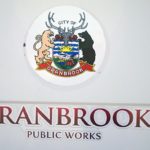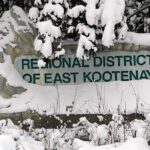Home »

Retail cannabis locales limited in bylaw
What Happened at Invermere Council This Week?
By Anne Jardine
The regular meeting of the District of Invermere council was held on Tuesday, August 14 at 7 p.m. in the Municipal Office.
Mayor Gerry Taft and Councillors Greg Anderson, Al Miller and Justin Atterbury, as well as Chief Administrative Officer Chris Prosser attended the meeting. The gallery included two guest presenters and seven members of the public.
Columbia Valley Youth Network Presentation
 After adoption of the agenda and minutes of the council’s July 17 meeting, Mayor Taft welcomed Pam Meunier and Angela Miller of the Columbia Valley Youth Network to present a report on their previous year’s activities and plans for 2019. Ms. Meunier explained that the Columbia Basin Trust funded this network to create a three-year plan to identify priorities for the delivery youth programs to the valley, spans the communities of Canal Flats, Invermere, Windermere, Edgewater, and rural areas north to Spillimacheen. It is the largest geographic network in the Basin. This is year two of the committee’s work.
After adoption of the agenda and minutes of the council’s July 17 meeting, Mayor Taft welcomed Pam Meunier and Angela Miller of the Columbia Valley Youth Network to present a report on their previous year’s activities and plans for 2019. Ms. Meunier explained that the Columbia Basin Trust funded this network to create a three-year plan to identify priorities for the delivery youth programs to the valley, spans the communities of Canal Flats, Invermere, Windermere, Edgewater, and rural areas north to Spillimacheen. It is the largest geographic network in the Basin. This is year two of the committee’s work.
Their process has been singled out by Columbia Basin Trust for best practice. The process began in 2017 with an extensive regional survey of almost 600 youth (ages 12-18) from all the communities through the three youth centres in Invermere, Canal Flats, and Edgewater, and through the schools. Ms Miller went on to elaborate the priorities for programming as determined by the surveys. These priorities included: skill building, leadership, career development, community participation, arts, social activities, and personal interests.
The youth centres have a regular attendance and participation averaging 165. The greatest barrier to participation is transportation, especially in the rural and disbursed areas.
The role of the network is not necessarily to deliver the programs, but rather to assist the youth centres in planning and resources. In Invermere, the activities are targeted by age; in the other communities this is not so much the case. Looking to year three of their plan, the Youth Network hopes to conduct follow-up surveys of youth, to support implementation of programs that will address the identified priorities, and to continue to build participation and involvement of the youth of the region.
The mayor and council complimented the report and invited the delegation to return and present future updates. They also asked the network representatives to let them know if there are specific ways the district can help.
Retail Cannabis Zoning Bylaws
Council voted unanimously to receive the report from the July 17 public meeting on the proposed cannabis zoning bylaw and to approve the third and final reading of
Bylaw 1547, which amends the zoning Bylaw No. 1145 of 2002 to limit locations of cannabis retail outlets, stating: “where the retail sale of cannabis is proposed, it shall not be located on 7th Avenue from 9th Street to 13th Street; it shall not be located within 100 metres of a public school.”
Mayor Taft commented that the public hearing on July 17 was surprisingly positive. He said there has been no real controversy thus far, but perhaps issues will arise after the federal legalization later in October. We have taken a fairly liberal approach. We do have local input, and we will look at all applications on a case-by-case basis. We will continue to consider and respect community values.”
Coun. Miller added, “I’m okay with the wording (of the bylaw). And we can always put in a further amendment anytime as provincial and federal regulations come down.”
Retail Plastic Bags
Council approved the motion that in the November 2018 General Election there will be an opinion question: “Do you/would you support a bylaw that bans plastic check-out bags at all retail stores within Invermere.”
In the February 20 meeting, Coun. Denchuk introduced the idea of creating such a bylaw. It was discussed at subsequent meetings and it was decided that such a ban should not be brought in without wide consultation. This opinion poll would be the first step in that process.
Correspondence
Council received the 2017/2018 Forest Practices Report and a thank-you letter from the Wings Over the Rockies Festival Committee.
Question Period
Two members of the public are interested in establishing a local cannabis business and asked questions about the district’s approval process for cannabis business licenses.

Mayor Taft advised, “There is really a three step process: First, apply for the license, then once formal application has been made, come to the district and present the business plan and subject the plan to discussion and public hearing. At this point, if the district says ‘no,’ the proposal dies; if the plan is approved locally, then it goes back to the province for licensing. The province could still say no, but they generally approve if the local community is in support.”
The ensuing discussion brought out these points, showing that the provincial government has been preparing for legalization and the license process is quite rigorous:
– The BC government’s Liquor and Cannabis Control licensing portal is now open for applications.
– The initial license fee is $7,500, non-refundable once the process is underway.
– Annual renewal fee after that is $1,500. (By comparison, an initial retail liquor license fee is $4,500. And annual renewal fee is based on liquor sales totals for the previous year.)
– The licensing process requires criminal and financial record checks, proof of a location and lease agreement, and a complete business plan.
– All cannabis products must be obtained from federal government controlled sources.
– No cannabis product is to be consumed on the business site.
– Community standards will govern the zoning and the location as well as appearance standards of the business. A municipality has the power to decide not to allow operation of recreational cannabis businesses.
– Recreational cannabis will be legal as of October 17, 2018.
Provincial and federal government websites give much more details about the rules and regulations that will apply.
One other member of the public complimented the district’s beautiful flowerbeds. With reference to the single-use plastic bag survey, he requested that the plastic checkout bag opinion poll question be also referred to the RDEK because there are a number of stores just out of the Invermere boundary who also use plastic bags.
e-KNOW







